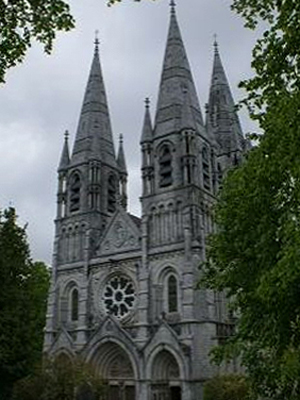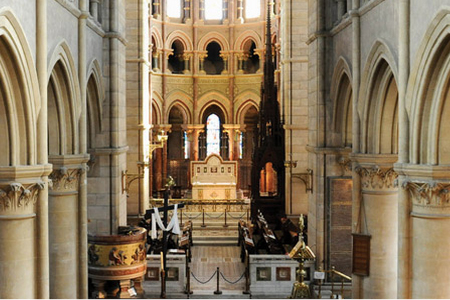| |
 |
 |
 |
| Comment on this report, or find other reports. |
 |
| Our Mystery Worshippers are volunteers who warm church pews for us around the world. If you'd like to become a Mystery Worshipper, start here. |
 |
| Find out how to reproduce this report in your church magazine or website. |
|
|
| 2671: St Fin
Barre’s Cathedral, Cork, Republic of Ireland |
 |

|
 |
Mystery
Worshipper: William Dewy.
The church: Cathedral
Church of St Fin Barre, Cork, Republic of Ireland.
Denomination: Church
of Ireland, United
Diocese of Cork, Cloyne and Ross.
The building: The
present French Gothic Revival cathedral was designed by the
architect William Burges, who won a competition for the commission
of a new cathedral in 1863 to replace an earlier medieval building.
The ornate cathedral is built of Cork limestone, and the massive
exterior boasts three tall towers topped with graceful spires.
Inside, the eye is drawn upward, where the light and colour
are to be found. The interior walls of the nave are of Bath
stone covered in red Cork marble, which seemed dark and brooding
in the vespers light.
The church:
The church community enjoys a rich choral tradition, with a
choral eucharist every Sunday and choral evensong on Fridays
and Sundays. The daily office is read morning and evening on
other days. In addition to the adult choir, there is a boys’
choir, a girls’ choir and Cathedral Kidz (sic), a less
formal junior choir.
The neighbourhood: St
Fin Barre established a church and a monastery on the limestone
cliffs above the River Lee in 606AD, and there has been a worshipping
Christian community at this location ever since – a nearly
overwhelming thought to an American. Cork is a city of some
120,000 in the south of Ireland. It's a vibrant community with
many fine restaurants and pubs and schools, including University
College, Cork.
The cast: The
Very Revd Nigel Dunne, dean of Cork, served as officiant, and
the Revd Ted Ardis was cantor. I believe that Malcom Wisner
and James Taylor served as choirmaster and organist for the
office, but they were not mentioned by name in the service leaflet.
The date & time: Sunday,
2 March 2014, 7.00pm.
What was the name of the service?
Choral Evensong.
How full was the building?
I counted 19 in the surpliced choir and 20 people in the nave.
With the clergy, 41 were present.
Did anyone welcome you personally?
A friendly usher greeted me quietly in the back of the nave as she handed me a prayer book and a hymnal.
Was your pew comfortable?
It was a pew. It was a rather plain unpadded bench with a kneeling
rail permanently attached a few inches off the floor. There
were small cushions marked "Kneel to pray" hanging
from the back of the pew ahead. Serviceable enough for a service
of an hour or less.
How would you describe the pre-service
atmosphere?
Quiet and reverent. Expectant, too.
What were the exact opening words of the
service?
"Rend your heart, and not your garments, and turn unto
the Lord your God: for he is gracious and merciful, slow to
anger, and of great kindness, and repenteth him of the evil."
What books did the congregation use during the
service?
The Book of Common Prayer for the Church of Ireland
(2000) and the Church Hymnal 5th Edition (2000).
What musical instruments were played?
A pipe organ, very expertly played.
Did anything distract you?
I rather wished I had taken a seat closer to front and centre so that I could have better seen the choir. The singers on the north side of the chancel were hidden by the pulpit, but I thought that to move around like the tourist I was would have been disruptive.

Was the worship stiff-upper-lip, happy clappy, or
what?
"Stiff upper lip" sounds rather negative, but the
worship was quite positively and affirmingly so. Everything
was done beautifully and with great decorum. I was particularly
delighted that the people in the congregation were not passive
spectators, but actively joined in the prayers, the creed, and
two hymns. I was particularly pleased with the congregational
singing of Gwalchmai.
Exactly how long was the sermon?
There was no sermon.
Which part of the service was like being in
heaven?
The high points were the canticles, both the Magnificat and Nunc Dimittis (Moeran in D) sung by the choir, and also the anthem, Stanford's O for a closer walk with God.
And which part was like being in... er... the other place?
The nave itself wasn’t particularly hellish, but it wasn’t inviting. The skeleton of a pew in a rather cold building, surrounded by brownish dark walls and hymn-boards set with numbers left from a previous service, let me know I was in the cheap seats.
What happened when you hung around after the service looking lost?
The friendly usher who handed me a prayer book and hymnal before the service told me that I could take photographs now that the service had ended.
How would you describe the after-service
coffee?
None was offered.
How would you feel about making this church your regular (where 10 = ecstatic, 0 = terminal)?
8 – If I lived near Cork, I could imagine myself attending
the office a few times a month. If I lived in Cork, I would
audition for the choir!
Did the service make you feel glad to be a
Christian?
Oh, yes.
What one thing will you remember about all this in seven days' time?
The friendliness and welcoming smile of the usher. |
|
|
 |
 |
 |
| We rely on voluntary donations to stay online. If you're a regular visitor to Ship of Fools, please consider supporting us. |
 |
 |
 |
| The Mystery Pilgrim |
 |
| One of our most seasoned reporters makes the Camino pilgrimage to Santiago de Compostela in Spain. Read here. |
 |
 |
 |
| London churches |
 |
| Read reports from 70 London churches, visited by a small army of Mystery Worshippers on one single Sunday. Read here. |
| |
|
|
|
|


